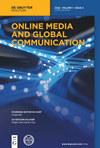论现代学术话语中的冲突再现
引用次数: 0
摘要
摘要本文讨论了媒体研究人员对“冲突”一词的理解,社会科学家在这一类别中包括哪些类型的经验对象,以及在俄罗斯和国外现代媒体研究的背景下对这些对象进行分类和理论理解的可能性。还讨论了媒体与冲突互动的理论问题、基于理论的冲突研究方法以及冲突的类型和关键主题,这些问题已成为国内外主要媒体学术期刊上发表的科学论文的实证研究主题。在讨论本研究的实证结果时,根据哈贝马斯反对冲突的反价值观的传播行为理论,提出了在媒体中培养伦理道德价值观的必要性。本文章由计算机程序翻译,如有差异,请以英文原文为准。
On representation of conflict in modern academic discourse
Abstract This article discusses media researchers’ understanding of the term “conflict,” what types of experience objects social scientists include in this category, and the possibility of categorization and theoretical understanding of these objects in the context of modern media research in Russia and abroad. Also discussed are the theoretical issues of the interaction between media and conflict, theory-based methodology of conflict research, and the types and key subjects of conflict, which have become the subjects of empirical research on scientific papers published in major media academic journals at home and abroad. In discussing the study’s empirical results, the necessity of cultivating ethical and moral values in the media, according to Habermas’s communicative behavior theory where he opposes the anti-values of conflict, was raised.
求助全文
通过发布文献求助,成功后即可免费获取论文全文。
去求助
来源期刊

Online Media and Global Communication
Communication, Media Studies, Internet Studies, International Studies, International Relations-
自引率
0.00%
发文量
0
期刊介绍:
Online Media and Global Communication (OMGC) is a new venue for high quality articles on theories and methods about the role of online media in global communication. This journal is sponsored by the Center for Global Public Opinion Research of China and School of Journalism and Communication, Shanghai International Studies University, China. It is published solely online in English. The journal aims to serve as an academic bridge in the research of online media and global communication between the dominating English-speaking world and the non-English speaking world that has remained mostly invisible due to language barriers. Through its structured abstracts for all research articles and uniform keyword system in the United Nations’ official six languages plus Japanese and German (Arabic, Chinese, English, French, Russian, Spanish, Japanese, and German), the journal provides a highly accessible platform to users worldwide. Its unique dual track single-blind and double-blind review system facilitates manuscript reviews with different levels of author identities. OMGC publishes review essays on the state-of-the-art in online media and global communication research in different countries and regions, original research papers on topics related online media and global communication and translated articles from non-English speaking Global South. It strives to be a leading platform for scientific exchange in online media and global communication.
For events and more, consider following us on Twitter at https://twitter.com/OMGCJOURNAL.
Topics
OMGC publishes high quality, innovative and original research on global communication especially in the use of global online media platforms such as Facebook, TikTok, YouTube, Twitter, Instagram, WhatsApp, Weibo, WeChat, Wikipedia, web sites, blogs, etc. This journal will address the contemporary concerns about the effects and operations of global digital media platforms on international relations, international public opinion, fake news and propaganda dissemination, diaspora communication, consumer behavior as well as the balance of voices in the world. Comparative research across countries are particularly welcome. Empirical research is preferred over conceptual papers.
Article Formats
In addition to the standard research article format, the Journal includes the following formats:
● One translation paper selected from Non-English Journals that with high quality as “Gems from the Global South” per issue
● One review essay on current state of research in online media and global communication in a country or region
 求助内容:
求助内容: 应助结果提醒方式:
应助结果提醒方式:


